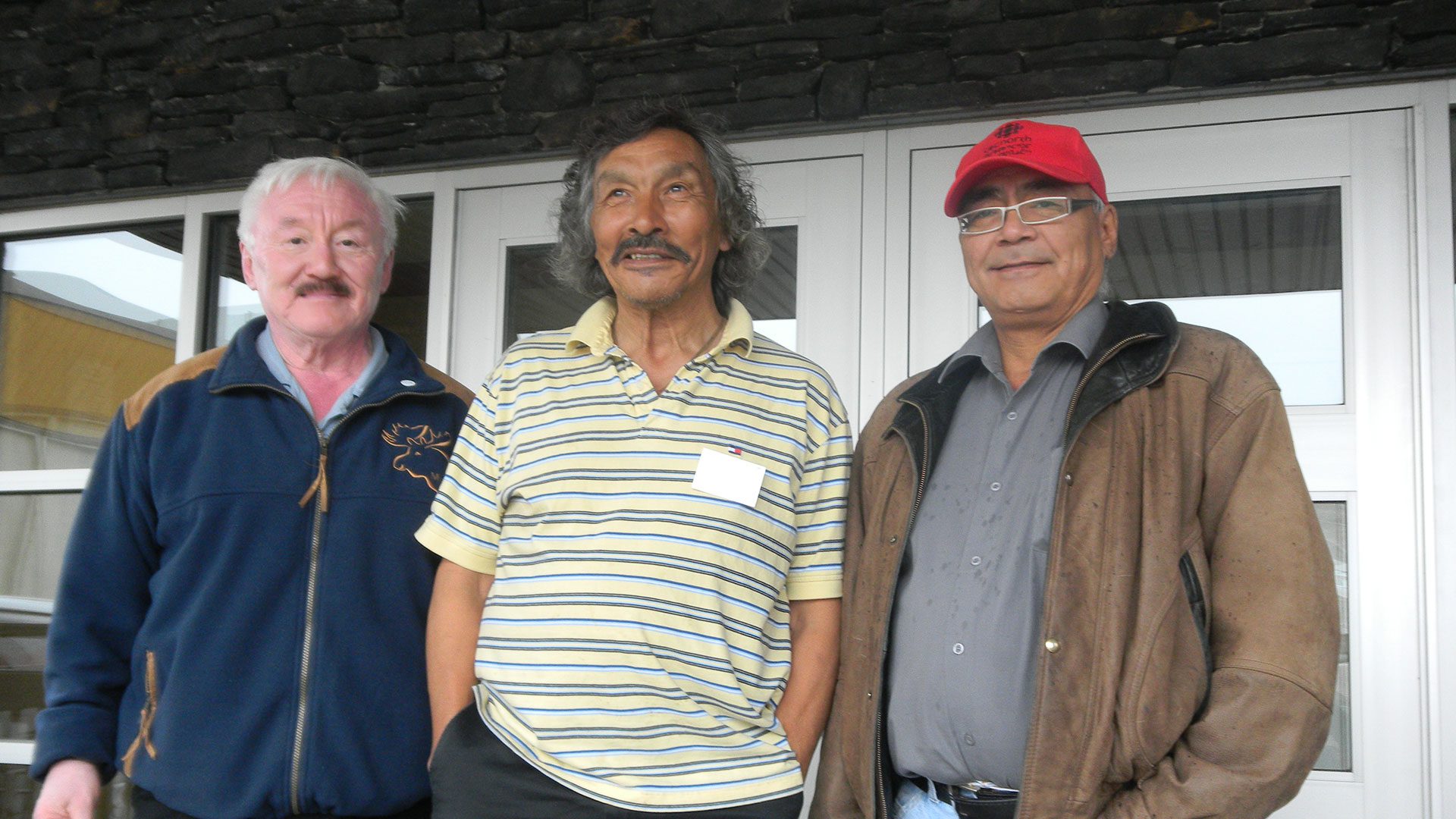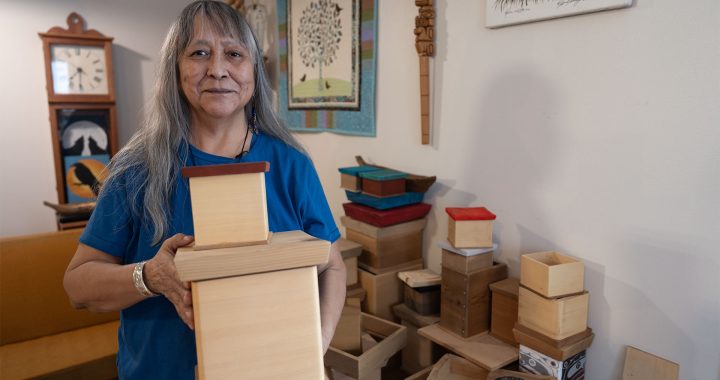
The RCMP detachment in Iqaluit. The Mounties say they won't hand over a complaint filed against a French priest that was lodged in the 1990s. Photo: APTN.
An Inuk woman is fighting to get her father’s criminal complaint to the RCMP decades after he reported being sexually abused by a French priest.
But the police have denied Tanya Tungilik’s request under the Access to Information and Privacy Act (ATIP) even though Marius Tungilik and Johannes Rivoire are both dead.
“They want me to wait 20 years,” Tanya said from her home in Rankin Inlet, Nunavut.
“They say it is a matter of privacy.”
Tanya said the RCMP also refused a request from the Public Trustee of Nunavut, which oversees her father’s estate and applied for the file separately.
Marius, who died in 2012 at the age of 55, went to the RCMP in 1993.
He accused Rivoire, who spent 30 years preaching in Nunavut as a member of the Catholic Missionary Oblates of Mary Immaculate (OMI), of sexually abusing him in the late 1960s and ‘70s in Naujaat (Repulse Bay), Nunavut.
The priest also worked in Eskimo Point (now Arviat) and Igloolik.
“My father never discussed the abuse with us, his family,” Tanya said in an interview. “But we want to know what happened, what he went through.
“It’s not fair for the RCMP to make us wait.”
Tanya said her father was the first victim to lodge a complaint against the priest followed by three other Inuit.
Rivoire, who denied the allegations, was charged in 1998 with five counts of sexually abusing four children. He died in April.
But he never stood trial because he returned to Lyon, France in 1993.
The five charges were stayed in 2017.
Why they would be denying access?

Vancouver lawyer Sandy Kovacs, who is not involved in the case but has worked on similar, questions why the RCMP won’t release the file to the family.
“I don’t understand why they would be denying access,” said Kovacs of Kazlaw Injury and Trauma Lawyers. “It’s part of the family’s story and their generational trauma.”
Canada’s ATIP law allows citizens, corporations and media to access certain government files. The process can take weeks or years, depending on what is being requested or how efficient the government department or agency is at fulfilling requests.
Also, federal departments can deny or redact certain information in documents. Advice to a minister or classified information is generally redacted.
The privacy section of the Act states that a department or agency can withhold a file for 20 years after someone has died.
Kovacs has an adult client who was denied a record of all files in her own child sexual abuse case by an RCMP detachment in British Columbia in 2022 – even though the case was never investigated.
When the client went to the media about the situation in 2024, the RCMP released the record.
“It was practically the next day,” Kovacs noted.
She is not an ATIP expert, Kovacs said, but often sees adult survivors of child sexual abuse request their police and other files as part of processing their experience.
“It’s part of their healing,” she said, adding its something the RCMP should take into consideration.
There is no statute of limitations on sexual assault complaints in Canada.
‘That’s a shameful withholding’

Rivoire was a dual French-Canadian citizen. So Tanya was part of an Inuit delegation to France in September 2022 to raise awareness about the case and pressure politicians to send Rivoire back to Nunavut for trial.
The priest wasn’t legally required to return – although OMI claims it asked him repeatedly – and France doesn’t typically extradite its citizens.
Matt Malone, a lawyer and former professor who studies various ways the law protects secret information, suggested the Mounties were acting contrary to the spirit of the Act in Tanya’s case.
“That’s a shameful withholding,” said Malone, the current Balsillie Scholar at the Balsillie School of International Affairs at the University of Waterloo and founder of Open By Default, a website with the largest database of internal government documents ever made publicly accessible by the Investigative Journalism Foundation.
“That’s very callous to use (the Act) that way.”
Malone said the RCMP should take reconciliation with Indigenous peoples into consideration and strive to cause no further harm to victims.
He noted there were some remedies after the RCMP’s rejection that included filing an appeal to the Information Commissioner in Ottawa, seeking a judicial review in Federal Court and asking an MP to make the request on Tanya’s behalf.
“Under section 19(2)(c) of the Access to Information Act, ‘The head of a government institution may disclose any record requested under this Part that contains personal information if … the disclosure is in accordance with section 8 of the Privacy Act’,” Malone quoted from the Act.
“Section 8(2)(g) of the Privacy Act, ‘Subject to any other Act of Parliament, personal information under the control of a government institution may be disclosed … to a member of Parliament for the purpose of assisting the individual to whom the information relates in resolving a problem’.”
Tanya said she sent a letter to Nunavut MP Lori Idlout (NDP) but has yet to receive a response.
“What I want from the RCMP is to see my father’s full statement he made to the RCMP in 1993 and anything else in the case files, regarding Father Joannes Rivoire sexually abusing my father sometime between 1968 and 1970, in Repulse Bay, NWT,” Tanya said in her letter to Idlout that she shared with APTN News.
“My father went to the RCMP in Rankin Inlet, NWT because that’s where my father was living in 1993 … I want to see what my father said to the RCMP about what Rivoire did to my dad, and what other information they had on Rivoire.”
Nunavut separated from the N.W.T. to become its own territory in 1999.
Navigating the ATIP process is ‘tricky’

Malone said navigating the Act can be a bureaucratic nightmare.
“I study this stuff and it’s tricky for me,” he added in an interview.
Nunavut RCMP did not immediately respond when APTN asked whether the Rivoire case remains open following his death.
They charged Rivoire in 2021 after receiving a new complaint from an Inuk woman who accused the priest of sexually assaulting her more than 45 years ago. A new warrant was issued for his arrest.
The RCMP’s Access to Information and Privacy Branch said a review of the records located in Iqaluit showed the file was exempt from release under two sections of the Act.
“Please be advised that a review of the records located reveals that all of the information you have requested qualifies for exemption pursuant to subsection 19 (1) and paragraph 16 (1)(c) of the Act,” it said in a letter obtained by APTN.
Malone said the RCMP always rely on those sections, which protect the privacy of victims and their investigation. But noted they have some leeway to practice discretion, particularly in this case where both the complainant and accused are dead.
A member of the RCMP’s ATIP Branch, reached by email, said he was unable to comment.
A member of the RCMP Civilian Review and Complaints Commission said his agency does not deal with issues involving access to information.
Meanwhile, retired Quebec judge Andre Denis, who produced a non-legal and non-binding report on the Rivoire case for OMI, said he was also unable to access the Marius’ file or any RCMP records relating to the case.
The federal ministers for Crown-Indigenous Relations and Public Safety, which oversees the RCMP, did not respond to requests for comment.










